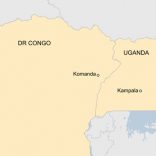Churchgoers killed in DR Congo attack linked to Islamic State
Nedbank CEO sees state-owned firms as biggest South African risk

Boomberg / Nedbank's CEO Mike Brown
South Africa’s debt-laden state-owned companies may represent the single biggest risk to the country’s economy, according to Nedbank Group Ltd. Chief Executive Officer Mike Brown.
The assets, which include power utility Eskom Holdings SOC Ltd. and South African Airways, have been “mismanaged over an extended period of time,” Brown said in a phone interview from Johannesburg on Wednesday. Their underperformance may spur more credit downgrades for the country, which in turn could increase Nedbank’s cost of funding by about five basis points, he said.
SAA, which has been losing money since 2011 and surviving on 19.1 billion rand ($1.4 billion) of state-backed guarantees, recently asked the government for 10 billion rand as part of a recapitalisation plan. That’s on top of a 2.2 billion rand injection for the airline last month to repay a loan. Eskom, which is embroiled in a corruption scandal, almost triggered an acceleration in its 350 billion rand of debt for having a qualified opinion on its latest annual financial statements, according to Nomura International Plc.
If South Africa’s local-currency debt is downgraded “it will be very bad for the South African economy and the already weak growth rates will be even weaker,” Brown said. While the country’s banks are well prepared to deal with such an event, “our challenge would be growing earnings at the rate we’ve targeted,” he said.
Moody’s Investors Service, which in a report this week said the Reserve Bank may come under increasing political pressure, is due to review South Africa’s credit rating on Aug. 11.
Recession impact
Moody’s cut its rating of South Africa’s foreign-currency debt to one level above junk after President Jacob Zuma fired his finance minister at the end of March, replacing him with someone who previously oversaw state-owned companies. S&P Global Ratings and Fitch Ratings also downgraded the country’s foreign-currency debt to junk.
A recession in South Africa has already impacted Nedbank’s earnings. The lender said in a statement on Wednesday that its first-half profit declined 3.7 percent due, in part, to its home market’s economic malaise. Rival Barclays Africa Group Ltd. said on Friday its total first-half income declined for the first time since 2009 amid heightened political and policy uncertainty and weak business and consumer confidence.
Eskom didn’t immediately respond to emailed questions on whether it had been close to a debt acceleration.













Leave a Reply
Be the First to Comment!
You must be logged in to post a comment.
You must be logged in to post a comment.